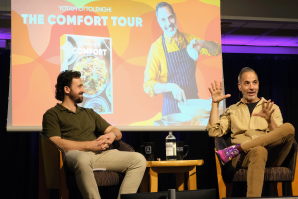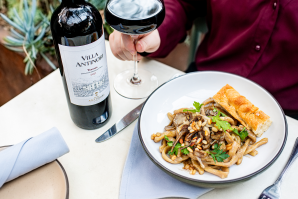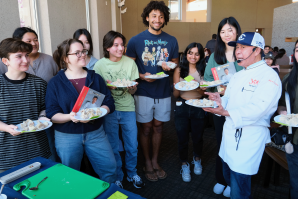The audience of Minh Phan’s “Mát Mát Mắt” performance at the Manetti Shrem museum at UC Davis took off their shoes and entered the world of the artist at work. A haunting cover of “Sài Gòn” played softly in the background, intermingling with the faint beep of the crosswalk signal outside.
Phan plucked a skewer — blanched, skinless tomatoes wrapped in a paper-thin radish around a basil leaf — from a branch and handed it to her co-performers, Sara De Blas Hernandez and Danny Waler Van. They, in turn, proffered the audience first the skewers, then fried pork or vegan spring rolls Phan was frying. Oil dripped from onto the participants’ fingers as they accepted the offering.
The April 19 performance — a “food event” that forgoes the menu and tableside chatter — was part of UC Davis’ year-long initiative Thinking Food at the Intersections, led by postdoctoral fellow Elizabeth McQueen (who played a “colonizer” in the performance) and part of the Mellon Foundation-funded Sawyer Seminar.
It follows the storytelling arc of other Thinking Food events over the year, including a mezcal tasting with Fabiola Santiago at the Robert Mondavi Institute, panels with cooking demonstrations (featuring chefs Saqib Keval and Norma Listman), flour milling and poetry workshops with Jim Franks, and book clubs revolving around food industries and practices.
The initiative is another piece of evidence that the Capital Region and broader Central Valley are becoming destinations not only for food producers, but also culinary cultivators, celebrities and creators.
Phan made pork and vegan spring rolls Phan during the
performance.

Taste and memory
When asked about her background as a chef, she often requests to not be called chef at all. As Phan will tell you, there is no “transition” from a Michelin award culinary artist to artist. “The practice is the same,” she says. “When you are an artist, you find a way to build community and share with other people.” To Phan, food is another medium which can be sourced from the garden or the store.
Phan’s background planted the seeds for her creative ventures. She grew up in Wassau, Wisconsin, after her family immigrated from Vietnam, before moving near Huntington Beach in Southern California.
McQueen, who interviewed Phan afterwards onstage during the performance, later reflects, “Minh Phan doesn’t often claim the title ‘chef’ — artist is more common, even when she’s earning Michelin stars. In many ways, I see this as rejecting the largely white and male dominated food industry that privileges the idea of the genius chef in lineage from Antoine Carême, Auguste Escoffier, etc. She’s taking a different role — one that I see as crucial in breaking down institutional binaries between that which feeds us gustatorily and those that fill other cultural hungers.”
This year marks the 50th anniversary of the Fall of Saigon, which marked the official end of the 30-year Vietnam War and led to the reunification of Vietnam under communist rule. On April 30, 1975, Saigon was renamed Ho Chi Minh City in honor of the late North Vietnamese leader. Afterward, hundreds of thousands of South Vietnamese fled the country.
She uses sculpture to reflect on her family experience immigrating from Vietnam. For instance, “Spring 2025: Mountain Submarine” (below) imagines a submarine overrun by nature. “My dad was in the navy, so this is for him,” she says. To her, the submarine is also significant because it represents labor that is done beneath the surface or hidden within the vessel, “instead of all the technology being hidden inside, I thought it would be fun to include lemons and herbs inside. I wanted to let technology be a relic of the past.”
“Spring 2025: Mountain Submarine” imagines a submarine overrun by
nature.

Memory was a central theme in Phan’s “Mát Mát Mắt.” At the start of the performance, Phan took up a yoke and, to the rhythm of “Sài Gòn,” half-danced to the first installation, “Spring 1975: Volcano Altar,” on which is projected a video montage of refugees. To her, the song is bittersweet: “What once was a cheerful song and celebration of the city is now a song of mourning and protest,” she says. She complemented the bittersweetness by sharing Meyer lemons and candies with the audience. In Vietnamese culture, she says, people receive candy after a funeral “to remind them that sweetness still exists.”
“I was thinking about what you put on the altar, how you honor the past and how you offer your peace to it,” Phan says after the performance. “We don’t often think about how our pasts — no matter who we are — can also be complicit in violence. To acknowledge what’s difficult is important so that we don’t repeat it.”
She carries a yoke on stage that she passes on to another performer, but only for a moment. Hanging from the yoke were what Phan calls copper “flying saucers” filled with herbs from her mother’s garden. “Often, our parents pass the burden or traumas onto their children, but I wanted to take it back and then offer it, first to the altar and then to nature,” she says. Seeds from the herbs were gifted to the Davis community.
Phan’s sculptures evoke volcanoes — “symbols of destruction and generosity” — and submarines. They are constructed out of ingredients and equipment from her culinary training — sweet rice flour, culinary calcium sulfate, gum arabic, cheesecloth — with foraged organic and found materials such as handmade ceramics, religious relics of maternal figures (the Virgin Mary and Quan Âm), chrysanthemum tea, strawberry candies, haw flakes, incense. These were spread apart outside the institution walls to allow for movement (and frying) to take place more organically.
Among Phan’s materials was rice from Central Valley grower Robin
Koda, whose grandfather started Koda Farms, California’s oldest
family-owned rice brand, in the 1920s.

Among the materials was rice from Central Valley grower Robin Koda, whose grandfather started Koda Farms, California’s oldest family-owned rice brand, in the 1920s. Phan remembered eating Koda Farms rice while growing up in the Midwest, the U.S.-grown grains reminding her of home. After nearly a century, Koda Farms shut down their operations in the San Joaquin Valley last year and licensed five of their trademarks to Western Foods, a grain manufacturer in Woodland. Robin Koda, part of the generation who decided to close the farm, attended the event and was introduced to the audience by Phan.
Phan has also experienced the winding down of a hard-won business. She started her Los Angeles Porridge + Puffs as a pop-up in 2014 and later earned two stars for Phenakite, a fine-dining restaurant she started in the dark times of 2020. She closed Phenakite in 2022 and Porridge + Puffs in 2024. She shares that when news of her receiving the second star slipped out at a family dinner, she was asked, “Why do you have to let them give you anything? It’s easier for them to take it away.” She mused at the connection between that comment and Michelin’s history in Vietnam, where the tire company sourced much of its rubber during the French colonial period.
“How do I negotiate this? I really don’t,” she says. In lieu of an explanation, she sat on two Michelin tires during the performance.
Taking care
After the event, Phan spoke to the various expectations people project onto her as chef, artist and host, and she challenges those notions. “It’s so natural for people to expect women, especially older women, to take care of others. But for me, it’s about simply taking care — without the expectations,” she says.
“Transcultural is a really important word to me. I use that word a lot, because I get asked when I was a chef, I was always asked what kind of food do I make? Californian? It is just something that comes from my creativity, but that answer never satisfies people. I think they really meant to ask what country are my parents from, which comes with its own issues.” In Vietnamese cooking, limes are a staple; but Phan’s mom inherited a Meyer lemon tree — which means they inherited a Meyer lemon palette, she says. When life gives you lemons instead of limes, sometimes you need to let them grow.
Phan’s performance provided an antidote to the tendency in the food-art scene to relegate any combinations to “fusion.” Her approach demonstrates how people who have been uprooted can plant new seeds (and grow new foods). Through food, performance and sculpture, Phan invites us to consider how personal and collective histories might be ritualized, reimagined and tasted.
–
Stay up to date on business in the Capital Region: Subscribe to the Comstock’s newsletter today.
Recommended For You

‘Comfort’ Comes to the Capital
Celebrity chef Yotam Ottolenghi visits the Sacramento Public Library
On Friday, October 11, Yotam Ottolenghi hosted a book talk and cooking demo at Sacramento’s Tsakopoulos Library Galleria. Some were surprised that such a big name in the culinary world would visit “Sacramento, of all places” — despite the agricultural epicenter Comstock’s readers know Sac to be.

Chefs, Growers and Citizen Scientists Are Embracing Mushroom Foraging and Its Culinary Potential
The farm-to-fork pipeline is well established in Sacramento — but what about forage-to-fork? We talked to some of the foragers, scientists, chefs and enthusiasts who want to see more foraging in the Capital Region.

Yan Can’t Quit: Why the Celebrity Chef Keeps Coming Back to the Capital Region
Martin Yan, host of long-running PBS cooking show, returns to his Davis alma mater to host a dumpling demonstration
With a career spanning over four decades, it’s safe to say Davis-trained celebrity chef Martin Yan continues to impress.

From Baker’s Stats to Stanzas: Jim Franks’ ‘Existential Bread’ Launches in Davis
Picking apart the stuff (seeds, stories, hoaxes) that go into what we think we know about bread
Baker and poet Jim Franks launched his experimental cookbook “Existential Bread” in Davis this week in collaboration with Student Collaborative Organic Plant Breeding Education, an interdisciplinary approach that offers a new way to consider our relationship with food and the complex processes and economics behind it.



